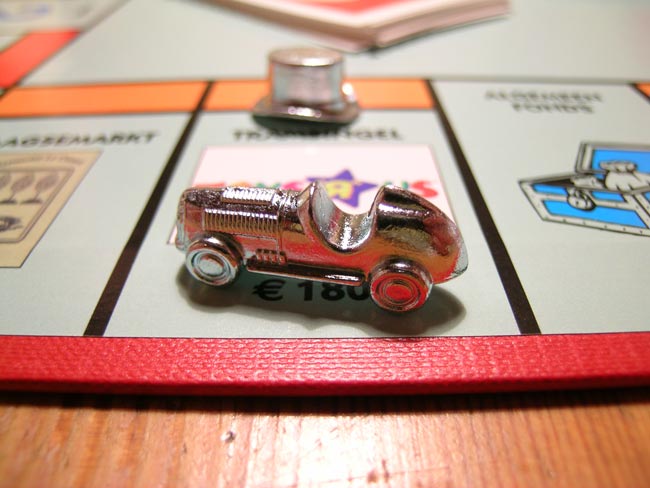Monopoly Brings Out the Worst in People

Get the world’s most fascinating discoveries delivered straight to your inbox.
You are now subscribed
Your newsletter sign-up was successful
Want to add more newsletters?

Delivered Daily
Daily Newsletter
Sign up for the latest discoveries, groundbreaking research and fascinating breakthroughs that impact you and the wider world direct to your inbox.

Once a week
Life's Little Mysteries
Feed your curiosity with an exclusive mystery every week, solved with science and delivered direct to your inbox before it's seen anywhere else.

Once a week
How It Works
Sign up to our free science & technology newsletter for your weekly fix of fascinating articles, quick quizzes, amazing images, and more

Delivered daily
Space.com Newsletter
Breaking space news, the latest updates on rocket launches, skywatching events and more!

Once a month
Watch This Space
Sign up to our monthly entertainment newsletter to keep up with all our coverage of the latest sci-fi and space movies, tv shows, games and books.

Once a week
Night Sky This Week
Discover this week's must-see night sky events, moon phases, and stunning astrophotos. Sign up for our skywatching newsletter and explore the universe with us!
Join the club
Get full access to premium articles, exclusive features and a growing list of member rewards.
Last weekend we had some folks over to play Monopoly. There were four adults and three kids, and we all wanted some family fun.
It's always chancy playing board games with good friends because people with dice in their hands, even very nice, mild mannered people, often turn cutthroat.
With this group, it started as the parents set up the board and the kids ran around.
Half the parents, it seemed, wanted to make sure our fiscally innocent children were protected from unscrupulous players. "Let's let the kids win," said one mother.
But the other parents didn’t give a hoot about the kids. "It's their fault if they don't understand economics. Let's take them for all they've got," said one father.
In the midst of that uncertain economic atmosphere in my dining room, we rolled the dice.
At first, it was jolly. Everyone had money and the Top Hat and the Thimble were neck and neck for buying property. But then, the Race Car zoomed ahead with several rolls of doubles and began to gobble up the board.
Get the world’s most fascinating discoveries delivered straight to your inbox.
He bought cheap stuff like Marvin Gardens and then announced his plan to overbuild with green houses and red hotels and somehow make the rest of us pay for the infrastructure.
The Boot was also soon out of control. That idiot bought Park Place and Broadway which, as any fool knows, are over-priced and she did this on a shoestring, so to speak.
Other players just went around and around the board, trying to keep out of trouble, but they often landed in jail spending their next three turns watching the world go by, hoping for doubles.
We had attempted to make the game fair by demanding that money from the income tax space and all penalty cards went into the center of the board in a pile and any lucky token landing on Free Parking got to have it all.
But wouldn’t you know, those with the most properties kept landing there, laughing, and stuffing the money down their shirts. They laughed even harder when the rest of the tokens had to keep shoveling their money into the kitty with nothing to show for it at all.
The Race Car had extended himself and suddenly wanted to get rid of Broadway and Park Place, but nobody wanted them. The houses and hotels he had blithely stacked up were now worthless and he had to sell them back to the bank for nothing.
The Race Car was also in trouble. Turns out he had no idea that $22 in rent would net him virtually nothing over the life of the game, so even with inexpensive property he was off the deep end. He had to mortgage everything or sell them to others across the board for a deep discount. We all saw that the Car had no absolutely no qualms about selling these pieces of junk to the kids on the other side who had little money but wanted houses because they were cute.
And then we discovered that the money in the bank was gone, probably eaten by the cat, and we sat there staring at Free Parking and wondering what to do.
It suddenly came to us. We could start over. We could chase the cat and find the money. We could give everyone a decent piece of property and hand back the houses to those who had lost them, but only if they agreed to not buy any houses until they were really, truly, solvent. And we could put Xs on Broadway and Park Place saying no one could put any money into those places until everyone was in good shape.
Of course the Top Hat was furious about having to decrease her lifestyle, but we all voted to comply, and we did.
And then we went to have dessert.
- Video: A Mother’s Touch
- Top 10 Worst Hereditary Conditions
- All About the Economy
Meredith F. Small is an anthropologist at Cornell University. She is also the author of "Our Babies, Ourselves; How Biology and Culture Shape the Way We Parent" (link) and "The Culture of Our Discontent; Beyond the Medical Model of Mental Illness" (link).
 Live Science Plus
Live Science Plus










